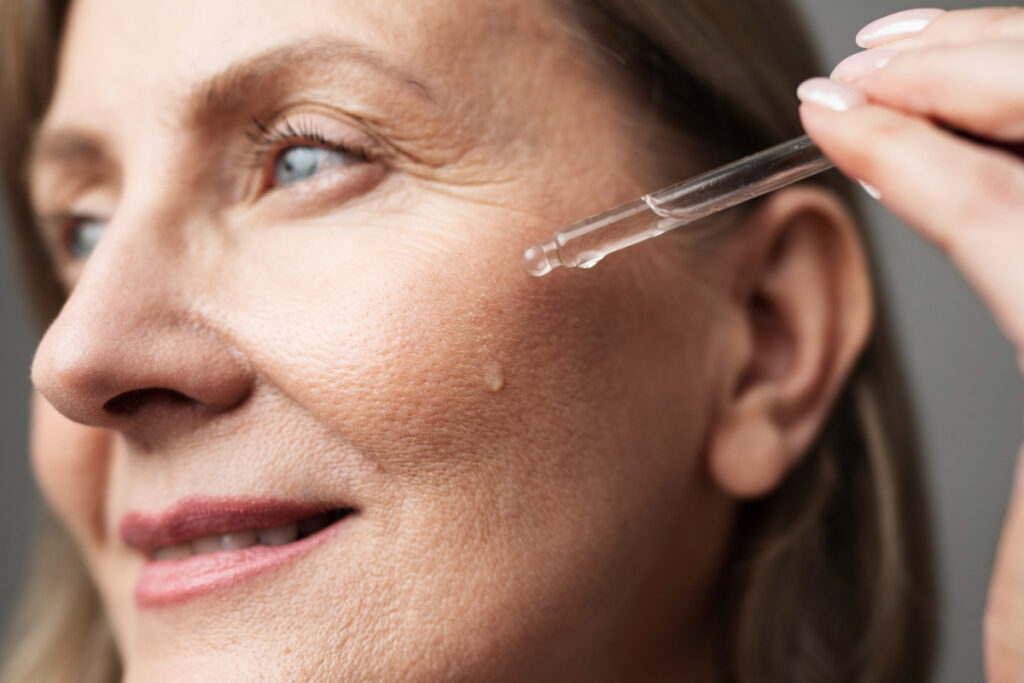Is adapalene anti aging?
This is a question gaining attention as more people look beyond traditional retinoids like tretinoin or retinol in their skincare routines.
Adapalene, originally developed as a treatment for acne, is now being studied and used for its anti-aging potential due to its unique properties as a third-generation retinoid.
Understanding how adapalene works and what science says about its role in skin rejuvenation can help determine if it belongs in your skincare plan.
Is Adapalene Anti Aging?
Adapalene is a synthetic retinoid derived from vitamin A, classified as a third-generation retinoid with targeted activity on skin cell receptors.
Unlike older retinoids, it was formulated to reduce irritation while still promoting cell turnover and collagen production.
Its ability to regulate keratinization and normalize skin cell renewal makes it effective in treating acne, but these same mechanisms also contribute to anti-aging benefits.
By accelerating the skin renewal cycle, adapalene reduces the accumulation of damaged skin cells that contribute to wrinkles, roughness, and uneven tone.
This renewal process improves skin texture and promotes a smoother, more youthful appearance over time.
How Adapalene Works on the Skin
Adapalene binds to retinoic acid receptors in the skin, which regulate cellular growth and differentiation.
By stimulating these receptors, it increases the rate at which old, damaged skin cells are shed and replaced with new ones.
This process also stimulates fibroblasts in the dermis to produce more collagen, which helps reduce the depth and visibility of fine lines and wrinkles.
Adapalene also helps regulate oil production and reduces clogged pores, which can improve skin clarity and minimize acne-related scarring.
Its antioxidant properties contribute to neutralizing free radicals, which are known to accelerate skin aging.
Together, these actions make adapalene a multitasking agent with both anti-acne and anti-aging benefits.
Clinical Evidence on Adapalene for Anti-Aging
Several clinical studies have evaluated adapalene’s effects on photoaged skin.
In comparative studies, adapalene has shown results similar to tretinoin in reducing fine lines, pigmentation, and roughness, but with fewer side effects for many users.
One study found that long-term use of adapalene 0.1% or 0.3% improved wrinkles and overall skin appearance in individuals with sun damage.
Although adapalene may work more slowly than stronger retinoids like tretinoin, its improved tolerability makes it a practical choice for sensitive or beginner skin.
Dermatologists often recommend adapalene as a first retinoid for anti-aging, especially for those who cannot tolerate stronger formulations.
While research is still ongoing, the evidence supports its role as a viable option in anti-aging skincare.
Benefits of Adapalene for Skin Rejuvenation
The benefits of adapalene extend beyond acne treatment and include several anti-aging effects.
It helps reduce fine lines by stimulating collagen and increasing skin elasticity.
It improves skin texture by promoting regular exfoliation and cell turnover.
It reduces hyperpigmentation and sunspots by accelerating the removal of pigmented skin cells.
It prevents acne breakouts that can leave scars and contribute to premature skin aging.
It provides antioxidant protection that helps reduce oxidative stress and slow the skin’s aging process.
These benefits accumulate gradually with consistent use, typically showing visible improvement after several months.
Side Effects and Safety Considerations
Like all retinoids, adapalene can cause irritation, dryness, and peeling, particularly in the first weeks of use.
It may also increase sensitivity to sunlight, requiring diligent use of sunscreen during the day.
To minimize side effects, adapalene should be introduced gradually, starting with applications two to three times a week before progressing to nightly use.
Moisturizers and gentle cleansers can help maintain the skin barrier and reduce irritation.
Pregnant and breastfeeding women should avoid retinoids, including adapalene, due to potential risks.
Overall, adapalene is considered safer and more tolerable than many other retinoids, making it accessible as an over-the-counter product in many countries.
How to Incorporate Adapalene into an Anti-Aging Routine
Using adapalene correctly is key to maximizing its benefits while minimizing side effects.
It should be applied at night to clean, dry skin before moisturizer.
A pea-sized amount is sufficient for the entire face, and more product will not enhance results but may increase irritation.
Daily use of sunscreen with SPF 30 or higher is essential to protect against sun sensitivity and enhance long-term results.
It is best combined with supportive skincare products such as hydrating serums and barrier-strengthening moisturizers.
Combining Adapalene with Other Skincare Ingredients
Adapalene works well with certain complementary ingredients that support skin rejuvenation.
Vitamin C serums in the morning provide antioxidant protection and enhance collagen synthesis.
Hyaluronic acid serums help counteract dryness and maintain hydration.
Niacinamide strengthens the skin barrier and reduces redness associated with retinoid use.
Gentle exfoliating acids, like lactic or mandelic acid, can be used occasionally to boost cell turnover but should not be used on the same nights as adapalene.
Avoid combining adapalene with strong exfoliants, benzoyl peroxide, or harsh scrubs, as these can increase irritation.
Natural Alternatives and Complementary Options for Anti-Aging
While adapalene is effective, some individuals prefer or need natural alternatives for anti-aging skincare.
Plant-based serums rich in antioxidants, peptides, and botanical extracts offer rejuvenating effects without the irritation risk of retinoids.
Illuderma is one such option, formulated with 16 natural active ingredients including hyaluronic acid, vitamin C, green tea, aloe vera, and jojoba oil.
Its combination of antioxidants, anti-inflammatories, and hydrating compounds helps reduce wrinkles, fade dark spots, and restore firmness.
Unlike retinoids, Illuderma is gentle enough for sensitive skin and can be used both morning and night.
It provides hydration, protection, and visible rejuvenation while supporting long-term skin health.
For those seeking a natural complement or alternative to adapalene, Illuderma fits seamlessly into an anti-aging regimen.
Give Your Skin the Support It Deserves
Is adapalene anti aging? The evidence suggests that this well-tolerated retinoid can indeed help reduce wrinkles, smooth texture, and promote collagen production.
When used consistently and safely, it can be an important tool for skin rejuvenation.
For individuals seeking a natural, gentle complement to retinoid therapy, Illuderma offers a science-backed solution with a blend of 16 powerful botanicals.
Visit the official Illuderma website to learn how it can elevate your anti-aging skincare routine and help you achieve radiant, youthful skin.









